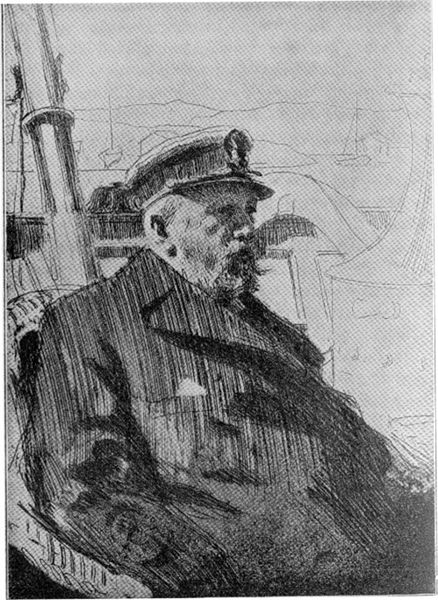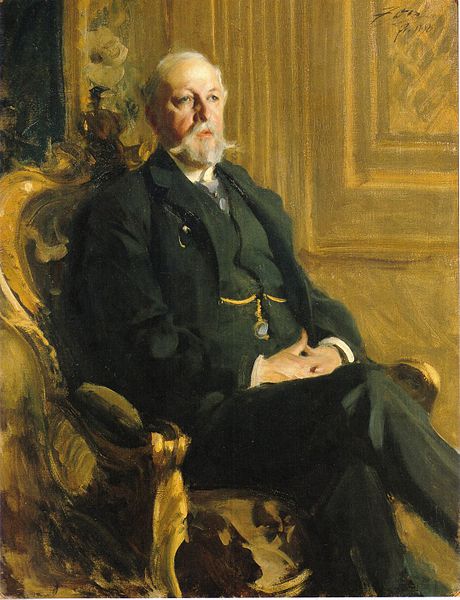<Back to Index>
- Aeronautics Pioneer Umberto Nobile, 1885
- Composer Alexander Nikolayevich Tcherepnin, 1899
- King of Sweden and Norway Oscar II, 1829
PAGE SPONSOR
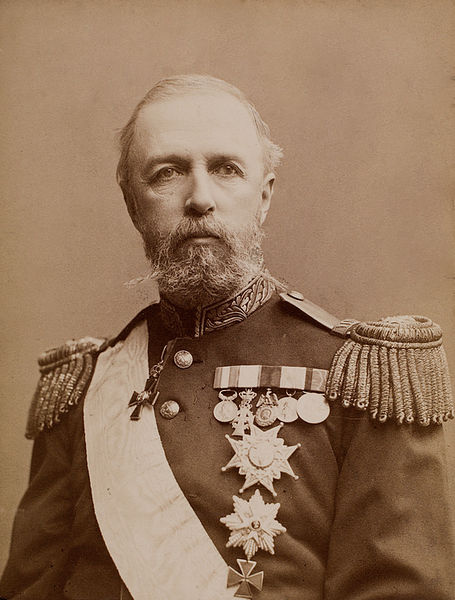
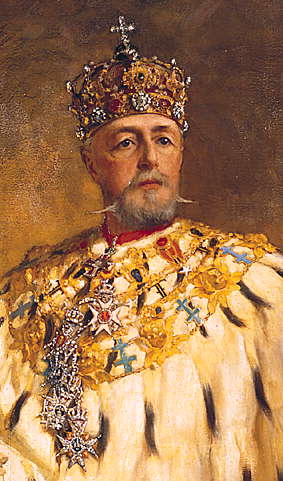
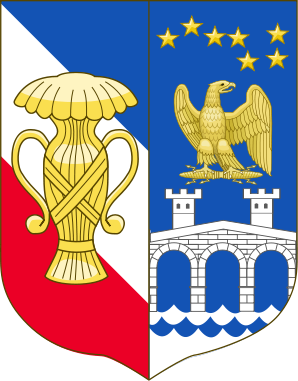
Oscar II (21 January 1829 – 8 December 1907), baptised Oscar Fredrik was King of Sweden from 1872 until his death and King of Norway from 1872 until 1905. The third son of King Oscar I of Sweden and Josephine of Leuchtenberg, he was a descendant of Gustav I of Sweden through his mother.
At his birth in Stockholm, Oscar Fredrik was created Duke of Östergötland. He entered the navy at the age of eleven, and was appointed junior lieutenant in July 1845. Later he studied at Uppsala University, where he distinguished himself in mathematics. On 13 December 1848, he was made an honorary member of the Royal Swedish Academy of Sciences.
On 6 June 1857 he married in Wiesbaden - Biebrich, Germany, Princess Sophia Wilhelmina, youngest daughter of Duke William of Nassau.
From 1859, when his father died, he was first in line to the Swedish throne after his oldest brother King Charles, who then had no male heirs (his son had died in infancy in 1854). His middle brother Gustaf had died in 1852.
He succeeded his brother Charles XV on 18 September 1872, and was crowned as king of Norway in the Nidaros Cathedral in Trondheim on 18 July 1873. At the accession he adopted as his motto Brödrafolkens väl / Broderfolkenes Vel ("The Welfare of the Brother Peoples"). While the King and the Royal Court resided mostly in Sweden, Oscar made the effort of learning to be fluent in Norwegian and
from the very beginning he realized the essential difficulties in the
maintenance of the union between the two countries. The political
events which led up to the peaceful dissolution of the union between Norway and Sweden in 1905 could hardly have been attained but for the tact and patience of the king himself. He was dethroned on 7 June 1905 by the Norwegian Parliament and renounced the Norwegian throne on
26 October. He declined, indeed, to permit any prince of his house to
become king of Norway, but better relations between the two countries
were restored before his death, which occurred in Stockholm on 8 December 1907. His
acute intelligence and his aloofness from the dynastic considerations
affecting most European sovereigns gave the king considerable weight as
an arbitrator in international questions. At the request of the United Kingdom, Germany and the United States in 1889 he appointed the chief justice of Samoa,
and he was again called in to arbitrate in Samoan affairs in 1899. In
1897 he was empowered to appoint a fifth arbitrator if necessary in the Venezuelan dispute, and he was called in to act as umpire in the Anglo - American arbitration treaty that was quashed by the United States Senate. He won many friends in the United Kingdom by his outspoken and generous support of Britain at the time of the Second Boer War (1899 – 1902), expressed in a declaration printed in The Times of the 2 May 1900, when continental opinion was almost universally hostile. He was the 1,027th Knight of the Order of the Golden Fleece in Spain and the 774th Knight of the Order of the Garter in 1881. Himself
a distinguished writer and musical amateur, King Oscar proved a
generous friend of learning, and did much to encourage the development
of education throughout his dominions. In 1858 a collection of his
lyrical and narrative poems, Memorials of the Swedish Fleet, published
anonymously, obtained the second prize of the Swedish Academy.
His "Contributions to the Military History of Sweden in the Years 1711,
1712, 1713," originally appeared in the Annals of the Academy, and were
printed separately in 1865. His works, which included his speeches,
translations of Herder's Cid and Goethe's Torquato Tasso, and a play, Castle Cronberg,
were collected in two volumes in 1875 – 76, and a larger edition, in
three volumes, appeared in 1885 – 88. His Easter hymn and some other of
his poems are familiar throughout the Scandinavian countries. His
Memoirs of Charles XII of Sweden were translated into English in 1879. In 1881 he founded the World's first open - air museum at his summer residence near Christiania, now Oslo.
In 1885 he published his Address to the Academy of Music, and a
translation of one of his essays on music appeared in Literature in May
1900. He had a valuable collection of printed and manuscript music,
which was readily accessible to the historical student of music. Being a theater lover, he commissioned a new opera house to be build by Axel Anderberg for the Royal Swedish Opera which was inaugurated on September 19, 1898. It is until today the current home of that institution. Oscar II told Henrik Ibsen that his Ghosts was
"not a good play". As he was dying, he requested that the theatres not
be closed on account of his death. His wishes were respected. King Oscar II was an enthusiast of Arctic exploration. Along with Swedish millionaire Oscar Dickson and Russian magnate Aleksandr Mikhaylovich Sibiryakov,
he was the patron of a number of pioneering Arctic expeditions in the
1800s. Among the ventures the king sponsored, the most important are Adolf Erik Nordenskiöld's explorations to the Russian Arctic and Greenland, as well as Fridtjof Nansen's Polar journey on the Fram. The name and portrait of Oscar II has been used as a trademark for the King Oscar sardines as well as for gingerbread cookies (pepparkakor) and other bakery products made by Göteborgs Kex AB. King Oscar II was married to Sophia of Nassau. They had 4 children. Oscar also is alleged to have had several extramarital children. Oscar
II (unlike his father) never officially recognized any illegitimate
children of his. He is also alleged to have had two sons with the actress Marie Friberg. His eldest son, Oscar Gustaf Adolf, duke of Värmland,
succeeded him as King Gustaf V of Sweden. His second son, Oscar,
resigned his royal rights on his marriage in 1888 with a
lady - in - waiting, Miss Ebba Munck, when he assumed the title of Prince Bernadotte and from 1892 he was known as Count Wisborg. The king's other sons were Charles, duke of Västergötland, who married Princess Ingeborg of Denmark; and Eugén, duke of Närke, well known as an artist. As King of Norway, he was, after the events of 1905, succeeded by his grandnephew Prince Carl of Denmark, grandson of his late elder brother King Charles, who ascended the Norwegian throne in 1905 with reign name Haakon VII. Harald V of Norway,
the great - grandson of Oscar II (grandson of his third son duke of
Västergötland), succeeded in 1991 to the throne of Norway
once held by his great - grandfather, Oscar II.
